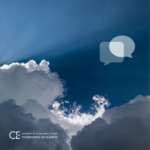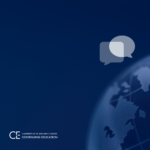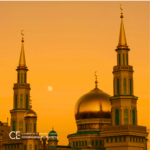
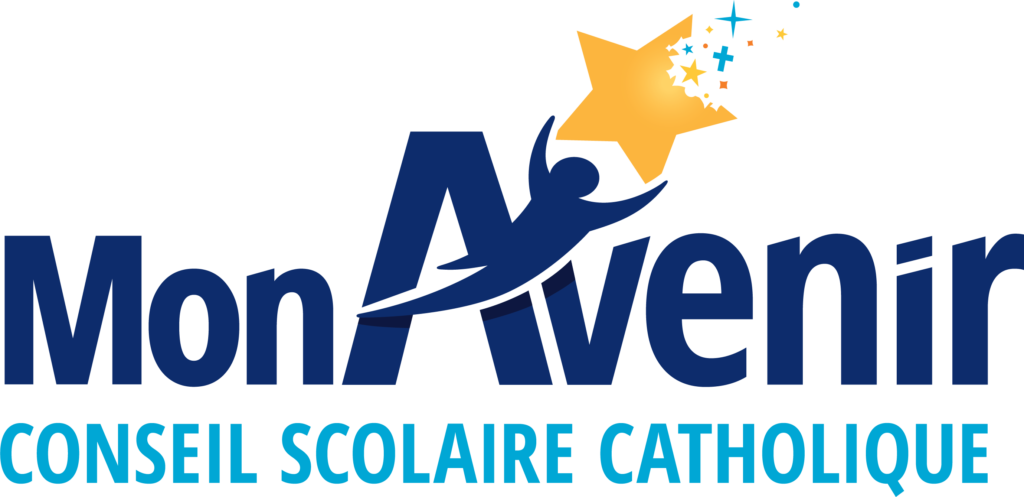
Enseignement Religieux en milieu catholique 1ere partie
- Durée: 16 semaines
- Dates: du 30 janvier au 31 mai 2025
- Horaire: le mardi soir de 19h à 21h et le samedi de 8h15 à 11h15
- Cours: Éducation religieuse en milieu scolaire catholique, 1ère partie
- Formatrice: Marilena Berardinelli, EAO
- Format: En ligne, webinaires en direct et asynchrone
- Frais: $50.00 frais d’inscription | $495 frais de scolarité
Nous contacter: Pour toute question relative aux cours menant à une qualification additionnelle, communiquez avec Disha Makhijani à ce.stmikes@utoronto.ca.
Inscrivez-vous

SMCE 5000 W25 – AQ: Éducation religieuse en milieu scolaire catholique, 1ère partie
Discover the Richness of Islamic Tradition
- Duration: 4 weeks
- Day(s): Wednesdays
- Date: Wednesday, October 9 to Wednesday, October 30, 2024
- Time: 6:00 pm-9:00 pm
- Location: Online, via Zoom
- Fees: $150
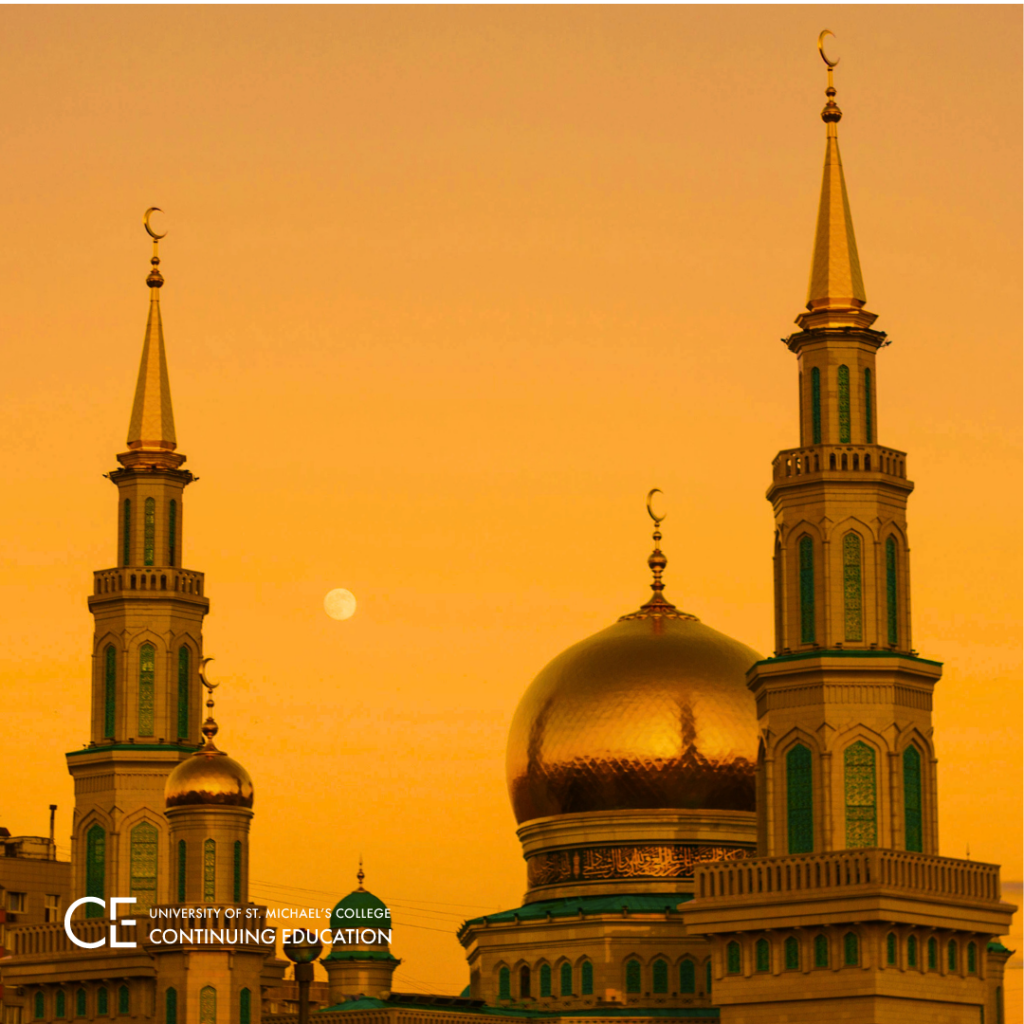
Course Overview
“Islam 101” explores the basics, traditions, and values of the religion of Islam and the Muslim community. This course provides a platform to discuss and reflect on different aspects of Islamic faith and civilization.
Learning Outcomes/Objectives:
1. The “Islam 101” course teaches respect for people’s diverse religions, cultures, and backgrounds.
2. It explores diverse cultural and religious traditions of the Muslim community.
3. It helps students understand common values of Abrahamic faiths and builds relationships between diverse traditions.
4. It provides a platform to discuss and reflect on different aspects of Islamic faith and civilization.
5. It provides responses to common questions about Islamic faith and contemporary issues.
Student Experience
The “Islam 101” course is suitable for students with different educational levels or professional backgrounds, who are interested in learning more about diverse cultures and traditions of the Islamic faith and the Muslim community.
Course Outline
Week 1:
Introduction: Basic Understanding
- Meanings of Islam
- Pillars of Islam
- Articles of Faith
- The Quran
- Prophet Muhammad
Week 2:
Islamic Law
- Sources of Islamic Law:
- Primary Sources: Quran, Traditions of Prophet Muhammad, and Consensus of Muslim scholars
- Secondary Sources: Analogy, Consideration of the Public Interest of the Community, Prior Revelations to Islam, People’s Cultures, etc.
- Islamic Schools of Thought
- Reasons and Ethics of Juristic Differences in Islam
Week 3:
Universal Values of Islam
- Sacredness of People’s Lives, Properties, and Honor
- Freedom
- Justice
- Human Respect and Dignity
- Care for the Environment
- Equality and Equity
- Security and Safety
- Mercy for All
- Human Fraternity
Week 4:
Islamic Way of Life
- Realistic Discourse
- Flexibility and Adaptation
- Peaceful Co-existence
- Work for the Common Good
- Community Involvement
- Muslims in Canada
About the Instructor
Dr. Wael Shehab holds a Ph.D. in Islamic Studies from Al-Azhar University and brings over two decades of experience in the area of the proposed course.
Related Courses
SMD 102 – Dialogues: Principles and Practices
SMCE – Diploma in Interfaith Dialogue
Thank you for your interest in SMD 203 – Islam 101
Unfortunately, the course you have selected is currently not open for enrolment. Please request a notification below so that we may promptly notify you when enrolment opens.
SMCE Course Enquiry
Questions?
Engage in the Art of Interfaith Dialogue
- Duration: 4 weeks
- Day(s): Mondays
- Dates:
- Monday, October 7
- **No Class Monday, October 14**
- Monday, October 21
- **No Class Monday, October 28**
- Monday, November 4
- Monday, November 11
- Time: 6:00 pm-9:00 pm
- Location: Online, via Zoom
- Fees: $150
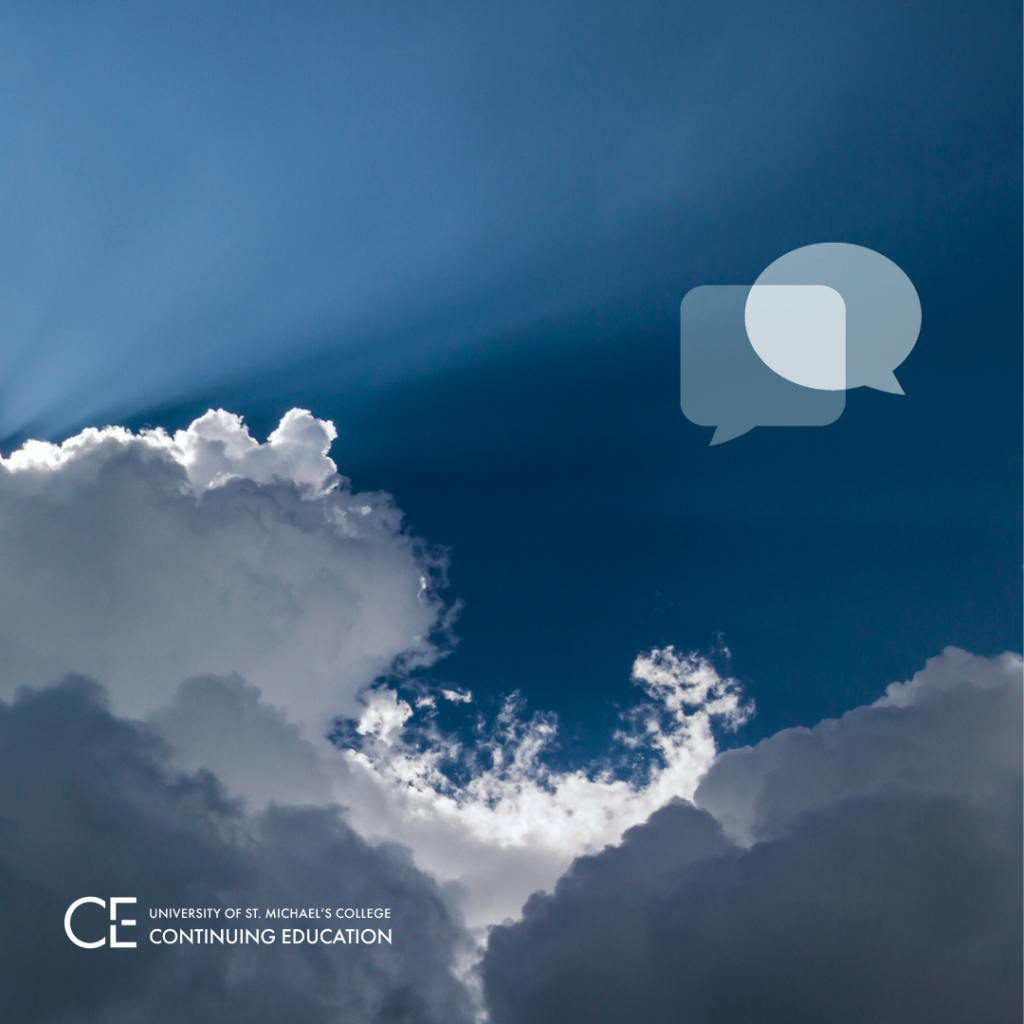
Course Overview
In this course, we will explore various contemporary approaches to interreligious dialogue and engagement, with a special emphasis on selected examples of such dialogue in Canada and the Greater Toronto Area. Including the four Modes of Dialogue as defined by the Pontifical Council for Inter-religious Dialogue (PCID ) and Dr. Leonard Swidler’s Decalogue of Dialogue. Students will have an opportunity to reflect on the potential of interreligious dialogue to foster mutual respect, practices of humility and hospitality, and collaboration on social issues.
About the Instructor
Instructor Fr. Prakash Anthony Lohale, OP is the Director of the Office for Interreligious Dialogue at the Archdiocese of Toronto, and an experienced facilitator in interreligious dialogue, fostering mutual respect and collaboration on social issues.
Learning Outcomes
Through their participation in this course, students will:
- Identify and describe different contemporary models for understanding religious diversity, including but not limited to the relationship(s) between Christianity and other religious paths.
- Reflect critically on lived examples of interreligious dialogue and collaboration in Canada, the Greater Toronto Area and students’ own local contexts.
- Cultivate greater personal openness to, and tools for, interreligious dialogue and engagement.
Related Courses
SMD 203 – Islam 101
SMCE – Diploma in Interfaith Dialogue
Questions?
Thank you for your interest in our course.
Unfortunately, the course you have selected is currently not open for enrolment. Please request a notification below so that we may promptly notify you when enrolment opens.
SMCE Course Enquiry
Explore World Religions and Cultivate Global Understanding
The Diploma in Interfaith Dialogue is designed to introduce students to the spirituality of many different religions and faith communities that are our neighbours, leading to meaningful dialogue and new points of connection with other people.
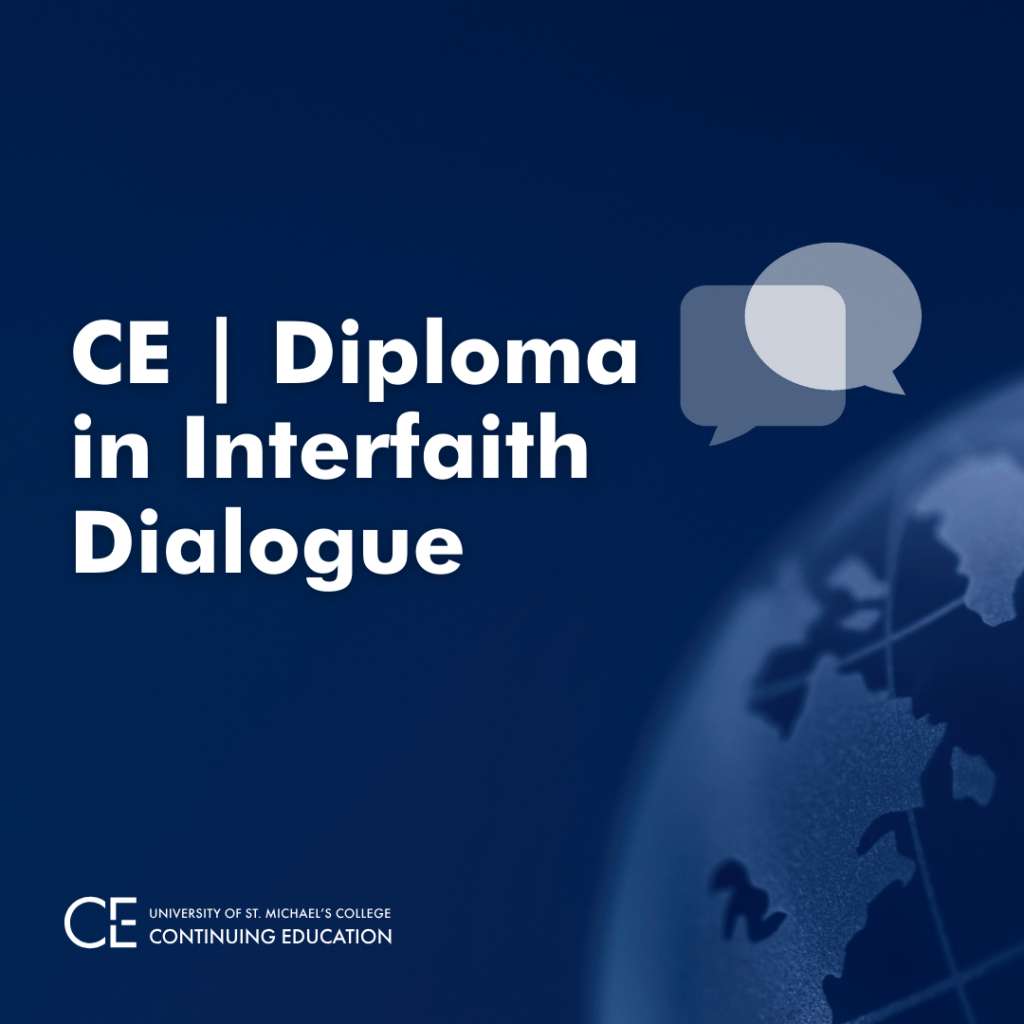
Diploma in Interfaith Dialogue Overview
What could be possible if we understood each other better?
The Diploma in Interfaith Dialogue aims to equip learners with tools to build meaningful connections across differences. Learners will explore the tenets, histories and traditions of major religions around the world alongside strategies for respectful and effective communication that encourages understanding.
This fully online program consists of 8 4-week courses taught by faith leaders. Throughout the program, learners will develop an introductory understanding of other faiths and explore topics exploring the intersection of interfaith encounters within aspects of culture and history in a deeper way. Learners of all faiths will bring their own knowledge and perspective to interactive sessions, and a final reflection project will provide space for applying course concepts to learners’ unique contexts and communities.
Diploma Outcomes
By the end of the program, students will be able to:
- Understand and recount the historical origins, central teachings, devotional practices, and social/political influences of at least four major religions (informational and confessional aspects)
- Identify the major texts of at least four religions and explain how those texts are used in each religious practice (informational and confessional aspects)
- Articulate how more than one religion engages in religious topics such as peace and justice, prayer and mystical experience, etc. (relational and practical issues)
- Demonstrate the relationship between religion and culture through the arts and education (relational and practical issues)
- Engage in meaningful dialogue with men and women of other religions at either a personal or institutional level. This does not mean that every student will be members of dialogue teams; rather, through experiential learning, they will come to understand the nuances of interfaith dialogue that can occur at every level: personal, local groups, and the larger institutional (when available).
Admission Requirements
- Admission is open to people of all faith traditions.
- A prior degree is not required to apply.
Fees
Thanks to a generous donation from the Scarboro Foreign Mission, we are able to offer all courses at a significantly reduced rate of $150. We are grateful for their support in providing accessible learning for all.
Program Requirements
The diploma comprises 8 12-hour courses, each offered over 4 weeks. (4 weeks at 3 hours per week).
Each course is delivered online via Zoom. Learners will also access an online Learning Management System where they will access readings and lecture materials as well as participate in reflective discussions.
Courses
All learners are welcome to enroll in individual courses based on their interests. There is no obligation to complete the entire diploma program to participate in a course.
Learners who wish to receive the Diploma in Interfaith Dialogue must complete the following requirements:
- 2 mandatory introductory courses:
- A Catholic Approach to Ecumenical and Interreligious Relations
- Theories and Practices of Dialogue
- 2 courses from Category I (faith-based courses)
- 2 courses from Category II (topics in interfaith encounter)
- 2 additional courses from either category
- Learners who wish to receive the diploma will complete a capstone reflection course
Category I: Faith Communities of Toronto and the World
These courses focus on the informational and confessional aspects of acquiring knowledge of another faith tradition’s history and beliefs as that faith tradition defines itself.
- First Nations spiritualities
- Buddhism
- Christianity: an Ecumenical Approach
- Hinduism
- Islam
- Judaism
- Sikhism
- Religious architecture/Sacred Spaces (cross-listed in Category 2)
Category II: Topics in Interfaith Encounter
These courses focus on the relational and practical issues that emerge in interfaith encounters.
- Women and Religion
- Religion, Migration and World Geography
- Global Christianity/inculturation
- Peace and Justice
- Prayer and Mysticism
- Religious architecture/Sacred Spaces (cross-listed in Category 1)
- Education and World Religions
- Religious Texts
Diploma in Interfaith Dialogue: Fall 2024 Courses
SMD 102 – Dialogues: Principles and Practices
SMD 203 – Islam 101
Thank you for your interest in our SMCE Diploma in Interfaith Dialogue.
Unfortunately, the course you have selected is currently not open for enrolment. Please request a notification below so that we may promptly notify you when enrolment opens.
SMCE Course Enquiry
Questions?
Join the Leaders of Tomorrow
The Diploma in Social Responsibility and Sustainability is a blended practical learning program that allows participants to work full-time while earning their professional Certificate in CSR and Sustainability.
This program uses the latest trends, insights, keynote speakers, transformational tools, research, and practical frameworks for application to deliver the knowledge and experience needed to advance one’s career in social and environmental responsibility.
Whether starting a career in Corporate Social Responsibility and Sustainability or bringing it to the next level, this program offers a custom-tailored experience for every participant.
Learn more about the Diploma in Social Responsibility and Sustainability



